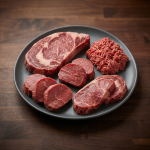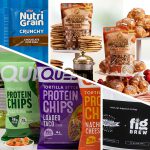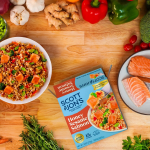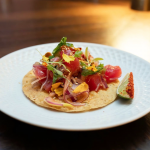After Ecommerce Pilot Program, Loop Enters Retailers Worldwide
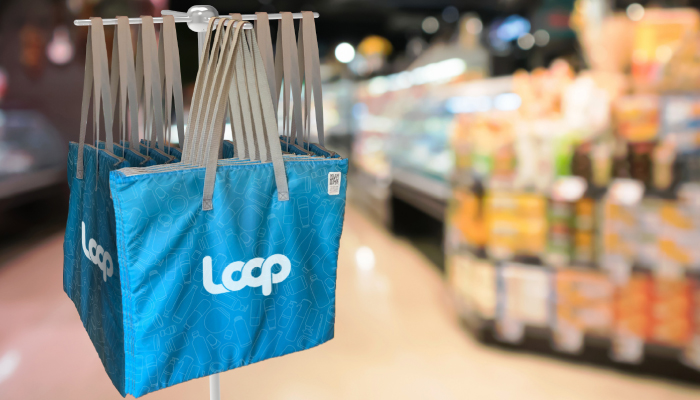
After two years of testing its reusable packaging platform through an ecommerce pilot program, Loop is using its findings to take the company to its next stage, rolling out in retailers worldwide as part of its mission to “eliminate the idea of waste.”
Since its launch in 2019, Loop has formed partnerships ranging from independent brands to CPG giants like PepsiCo, Unilever and Nestlé to create reusable packaging made of materials like metal or glass, which consumers return to Loop to be sanitized and reused once empty.
Loop’s retail rollout quietly began last December with France’s Carrefour, followed by Japan’s AEON in May and the United Kingdom’s Tesco this month. It’s set to launch in the U.S. with Kroger this fall, and will hit shelves at Duane Reade locations in the New York Metro area as well as Australia’s Woolworths in 2022. The company also launched a reusable cup partnership with McDonald’s in the UK this year, and is set to launch reusable packaging partnerships with Burger King and Tim Hortons in the U.S. and Canada.
By the end of the year, 300 retailers and restaurants are expected to be carrying Loop products, which will expand to 500 by the first quarter of 2022 and 1,000 by the end of next year, according to CEO Tom Szaky.
Its platform currently features 400 products across food and beverage, personal and home items including granola from Nature’s Path Organic, spices from Burlap & Barrel and Tropicana orange juice in the U.S., with 400 more slated to debut next year.
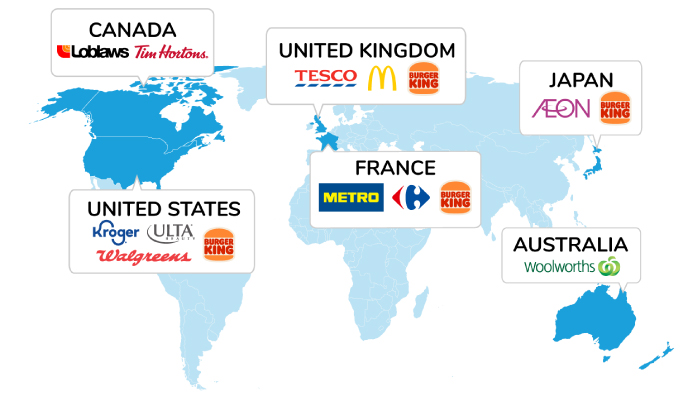
After testing the platform online through its own website and its retail partners’ ecommerce sites in Australia, Japan, France, Canada, the UK and the U.S. over the past two years, Szaky said the learnings were “almost identical” across all markets.
“It really speaks to a global truth that people are concerned about waste, and the things that appeal to them about reuse are universal versus culturally specific,” he said.
He said Loop found that consumers are attracted to the platform not only for sustainability reasons, but also because of the design and quality of the packaging. For example, consumers reported they “felt healthier” eating food and beverage products from packaging that isn’t plastic. While price has been a concern for some brands, consumers also shared that while they still prefer the price of the Loop packed products to be competitive with traditionally packaged counterparts, they’re willing to pay a deposit upfront as long as it is refunded upon return of the packaging.
No one specific product category was more successful than the other during the pilot, Szaky said, but he said Loop found that generally “non-eco” brands — like Ferrero’s Nutella in Europe or Pantene in the U.S. — had disproportionately better performances over brands that had already established themselves as “eco-friendly.”
“What it really goes to show is that consumers want to buy their performance products, but they want them to be more eco-friendly, and reuse is a good way to achieve that,” Szaky said.
The in-store model also takes away the “clunkiness” of the ecommerce pilot, which requires consumers to return the packaging through mail. Instead shoppers can now simply return packaging during their next trip to the store. This also saves Loop the expenses associated with shipping the products individually from consumers’ homes, Szaky noted. He said he sees retailers as a better fit for Loop than ecommerce stores, both for consumers and the company itself.
“We think online can work in some cases, but the learning was that in-store is really the big place to make the big bet,” Szaky said.
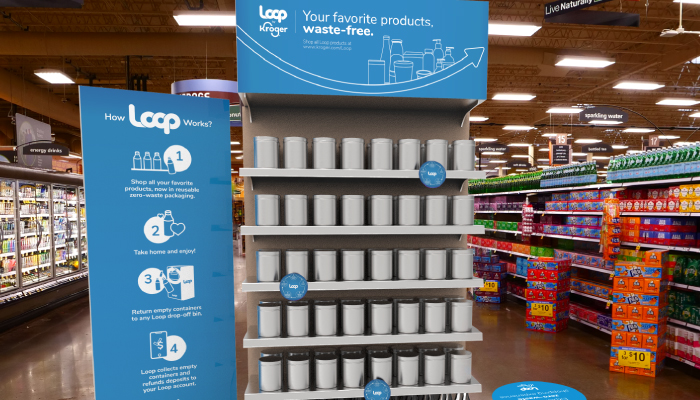
Most retailers are grouping Loop products together in one aisle of the store. Shoppers are offered returnable bags to return multiple items at once in collection bins located in retailers. To save the retailers on labor costs, Loop simply picks up the collection bins itself, transporting them to cleaning facilities to be sanitized for reuse. Consumers will be charged a deposit for the packaging, ranging in price depending on the item, which are then refunded through the Loop app. Szaky said Kroger will have in-store ambassadors for the first few months to explain the process to consumers.
Approximately 30 products will be sold in select Fred Meyer stores in the Greater Portland area, with brands including Gerber, Nature’s Path, Pantene, Seventh Generation and Clorox, as well as select products from Kroger’s Simple Truth private label brand. All store pilots range from 10 to 70 stores, and if launches go well, retailers add stores and expand product ranges, as has happened in Carrefour and AEON, Szaky said.
Kroger has worked with Loop since 2019, as the exclusive US grocer to offer Loop on its website for consumers in select East Coast cities. The initial pilot was so successful, Kroger expanded the online initiative nationwide. The partnership aims to give its shoppers “sustainable packaging choices they can feel good about,” said Jessica Adelman, Kroger’s group vice president of corporate affairs.
Eliminating packaging waste has been of increasing interest for grocers, retailers and CPG companies. In other efforts, as part of Closed Loop partners’ Beyond the Bag initiative and its Consortium to Reinvent the Retail Bag, select CVS, Target and Walmart locations last month began pilots for consumers to earn points for using specific reusable bags. Meanwhile, PepsiCo last week debuted compostable packaging for its snack brand Off The Eaten Path as part of its pep+ sustainability initiative unveiled earlier this month.
Looking ahead, Szaky said Loop aims to determine “how wide the system can go,” in terms of product categories (clothing is up next), in order to appeal to the widest swath of consumers. This will help establish the depth of products and retailers it will add to the platform, he said.
“The goal of loop is to be a worldwide platform for reuse that makes reuse as easy as possible for the three most important stakeholders — the brands, the retailers and especially the consumer,” Szaky said. “The wider we can take Loop, the more convenience it’s going to drive.”













